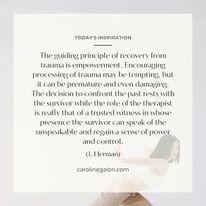Trauma recovery & empowerment
One of the biggest issues with trauma experiences is that they affect people’s sense of autonomy. As a result of trauma people often feel out of control and they might lose the connection with their own source of power. That’s why empowerment is such an important principle in recovery processes: re-establishing the pathway between a person and their strength is my first aim when doing trauma work.

This might seem like common sense but it’s not always common practice. How often do people who experienced trauma feel disempowered in their dealings with the police, the legal system, the medical system, and at times even in the therapy room? all these places that are supposed to be offering care and support can, by making some basic and mostly un-informed mistakes can become the setting for re-traumatisation, and this can make things even more difficult and complicated for the person, and hinder recovery.
Because this can happen easily it’s really important for me to, first of all, be aware of my client’s needs and pace; and second, take extra care with how and what interventions I offer to them. People who experienced trauma are in a really sensitive place and it’s my job to match them and be sensitive in turn, making sure we proceed gently and above all, not to push them towards untimely processing of the material they’re carrying in their mind and body.
Offering my clients a space that’s pressure-free, where they can take their time until they feel ready is for me, an act of empowerment, even if from the outside it seems like not much is going on. In my experience, giving people space and being present with them in that space, patiently waiting for them to find their way, is the foundation of trauma recovery processes.

Recent Comments